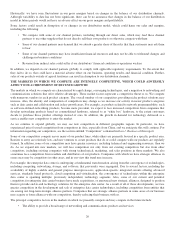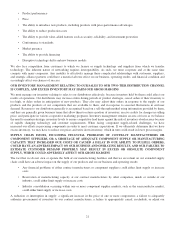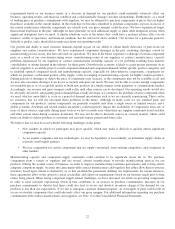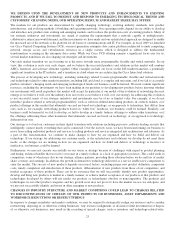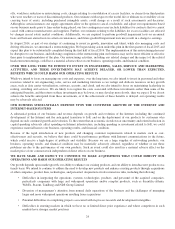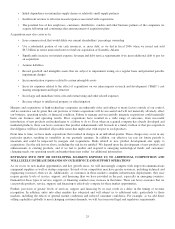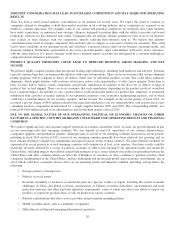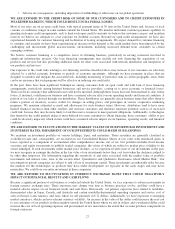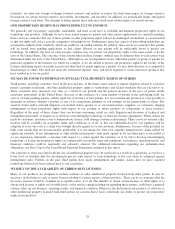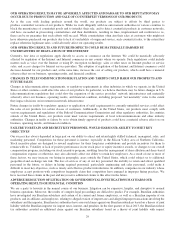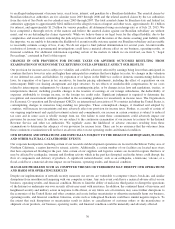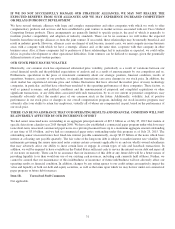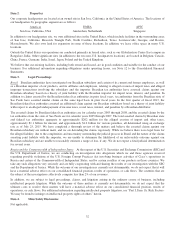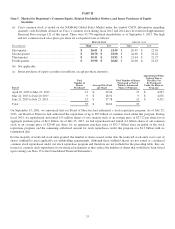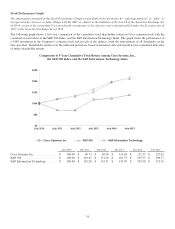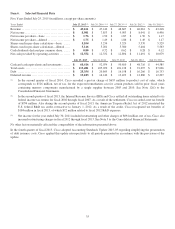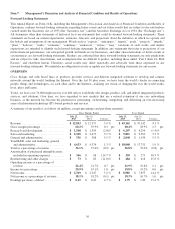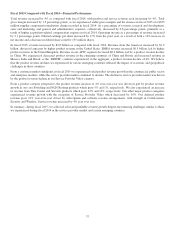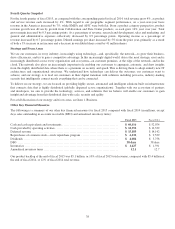Cisco 2015 Annual Report Download - page 38
Download and view the complete annual report
Please find page 38 of the 2015 Cisco annual report below. You can navigate through the pages in the report by either clicking on the pages listed below, or by using the keyword search tool below to find specific information within the annual report.to an alleged underpayment of income taxes, social taxes, interest, and penalties by a Brazilian distributor. The asserted claims by
Brazilian federal tax authorities are for calendar years 2003 through 2008 and the related asserted claims by the tax authorities
from the state of Sao Paulo are for calendar years 2005 through 2007. The total asserted claims by Brazilian state and federal tax
authorities aggregate to approximately $262 million for the alleged evasion of import and other taxes, approximately $1.1 billion
for interest, and approximately $1.2 billion for various penalties, all determined using an exchange rate as of July 25, 2015. We
have completed a thorough review of the matters and believe the asserted claims against our Brazilian subsidiary are without
merit, and we are defending the claims vigorously. While we believe there is no legal basis for the alleged liability, due to the
complexities and uncertainty surrounding the judicial process in Brazil and the nature of the claims asserting joint liability with
the importer, we are unable to determine the likelihood of an unfavorable outcome against our Brazilian subsidiary and are unable
to reasonably estimate a range of loss, if any. We do not expect a final judicial determination for several years. An unfavorable
resolution of lawsuits or governmental investigations could have a material adverse effect on our business, operating results, or
financial condition. For additional information regarding certain of the matters in which we are involved, see Item 3, “Legal
Proceedings,” contained in Part I of this report.
CHANGES IN OUR PROVISION FOR INCOME TAXES OR ADVERSE OUTCOMES RESULTING FROM
EXAMINATION OF OUR INCOME TAX RETURNS COULD ADVERSELY AFFECT OUR RESULTS
Our provision for income taxes is subject to volatility and could be adversely affected by earnings being lower than anticipated in
countries that have lower tax rates and higher than anticipated in countries that have higher tax rates; by changes in the valuation
of our deferred tax assets and liabilities; by expiration of or lapses in the R&D tax credit or domestic manufacturing deduction
laws; by expiration of or lapses in tax incentives; by transfer pricing adjustments, including the effect of acquisitions on our
intercompany R&D cost sharing arrangement and legal structure; by tax effects of nondeductible compensation; by tax costs
related to intercompany realignments; by changes in accounting principles; or by changes in tax laws and regulations, treaties, or
interpretations thereof, including possible changes to the taxation of earnings of our foreign subsidiaries, the deductibility of
expenses attributable to foreign income, or the foreign tax credit rules. Significant judgment is required to determine the
recognition and measurement attribute prescribed in the accounting guidance for uncertainty in income taxes. The Organisation
for Economic Co-operation and Development (OECD), an international association of 34 countries including the United States, is
contemplating changes to numerous long-standing tax principles. These contemplated changes, if finalized and adopted by
countries, will increase tax uncertainty and may adversely affect our provision for income taxes. Further, as a result of certain of
our ongoing employment and capital investment actions and commitments, our income in certain countries is subject to reduced
tax rates and in some cases is wholly exempt from tax. Our failure to meet these commitments could adversely impact our
provision for income taxes. In addition, we are subject to the continuous examination of our income tax returns by the Internal
Revenue Service and other tax authorities. We regularly assess the likelihood of adverse outcomes resulting from these
examinations to determine the adequacy of our provision for income taxes. There can be no assurance that the outcomes from
these continuous examinations will not have an adverse effect on our operating results and financial condition.
OUR BUSINESS AND OPERATIONS ARE ESPECIALLY SUBJECT TO THE RISKS OF EARTHQUAKES, FLOODS,
AND OTHER NATURAL CATASTROPHIC EVENTS
Our corporate headquarters, including certain of our research and development operations are located in the Silicon Valley area of
Northern California, a region known for seismic activity. Additionally, a certain number of our facilities are located near rivers
that have experienced flooding in the past. Also certain of our suppliers and logistics centers are located in regions that have or
may be affected by earthquake, tsunami and flooding activity which in the past has disrupted, and in the future could disrupt, the
flow of components and delivery of products. A significant natural disaster, such as an earthquake, a hurricane, volcano, or a
flood, could have a material adverse impact on our business, operating results, and financial condition.
MAN-MADE PROBLEMS SUCH AS COMPUTER VIRUSES OR TERRORISM MAY DISRUPT OUR OPERATIONS
AND HARM OUR OPERATING RESULTS
Despite our implementation of network security measures our servers are vulnerable to computer viruses, break-ins, and similar
disruptions from unauthorized tampering with our computer systems. Any such event could have a material adverse effect on our
business, operating results, and financial condition. Efforts to limit the ability of malicious third parties to disrupt the operations
of the Internet or undermine our own security efforts may meet with resistance. In addition, the continued threat of terrorism and
heightened security and military action in response to this threat, or any future acts of terrorism, may cause further disruptions to
the economies of the United States and other countries and create further uncertainties or otherwise materially harm our business,
operating results, and financial condition. Likewise, events such as widespread blackouts could have similar negative impacts. To
the extent that such disruptions or uncertainties result in delays or cancellations of customer orders or the manufacture or
shipment of our products, our business, operating results, and financial condition could be materially and adversely affected.
30


